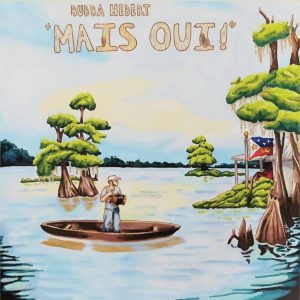As the great-grandson of the legendary Iry LeJeune, a cornerstone of Cajun music, and grandson of accordionist and cultural traditionalist Eddie LeJeune (Iry’s son), Bubba Hebert comes from Cajun royalty, though he would never say it that way. As a youth, Hebert was once considered a prodigy, creating a buzz about his advanced accordion chops early on.
For his debut, he could have easily channeled Iry by covering an album of his songs or even recording as a trio as Eddie did. Instead, he chose to put his own spin on things. He does cover Iry with a bolting rendition of “Went to the Dance,” but in a souped-up zydecajun style, with the four quick punchy beats on the “B” part being his own design. A 180 degrees away on the other side of the Cajun spectrum is the stirring dancehall waltz styled “Nobody Wants Me” from the cannon of Aldus Roger. Hebert adds his signature by closing with a knockout two-octave up-and-down scale that touches practically every button on his accordion’s keyboard.
It’s not your typical song selection found on a Cajun music debut. Surprisingly, the elegant “Quand T’es Pas La” wasn’t written by a Cajun but comes from the other side of the pond by English Cajun musician Phil Underwood, a longtime family friend. He premiered it at a Mardi Gras party, and the composition’s natural beauty struck Hebert so much that he had to learn it. The tune deviates from the normal 1-4-5 chord progression by being a 4-5-1-6-minor-3 minor. Hebert’s heartfelt, emotive vocals do “Quand T’es Pas La” justice, as does Jason Bergeron’s matching fiddle line.
Hebert wrote and co-wrote four tunes, including the blitzing instrumental “Ebenezer Jig,” named after a hamlet south of Crowley. The backstory is Hebert wanted a challenging riff he would play repeatedly, so he found one to place after the turn. Hebert’s other songs are in English. “Impossible” is a catchy, quasi-pop song. The protagonist heaps on rhyming superlatives like “indescribable,” “unstoppable,” and “astronomical” to describe the love of his life. In the process, Hebert made up a funny word “narcoticable,” like “narcotics”’ in an attempt to throw it over the top. Towards the end, the one-verse peppy tune briefly downshifts to skank to a reggae beat, before returning to a roar.
And speaking of fusions, the South African-styled cover “The Lion Sleeps Tonight” bounces to a zydeco beat, which Hebert refers to as “coco puff,” an apt description of the double clutchin’ beat in modern zydeco.
It may differ from what the purists clamor for because it is somewhat eclectic. On “That’s What Daddies Are For,” Hebert puts down his loud little box and finger-picks a bright-sounding acoustic guitar on an imagined tale of a daughter growing up to womanhood. It has the perfect family sentiment for mainstream country airplay, and it’d be a shame if it didn’t get noticed beyond Acadiana. Hebert doesn’t want to be pigeonholed just as a Cajun musician, and this set of tracks makes that statement well. Even so, he’s still a pretty damn good box player.




